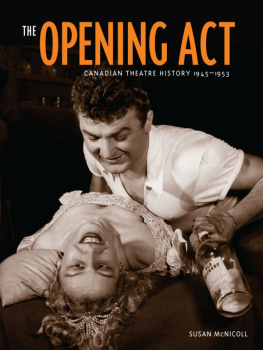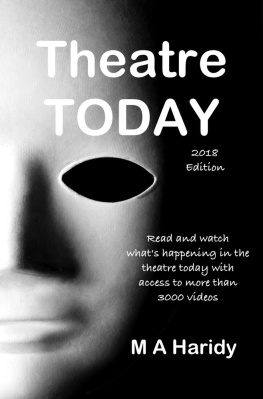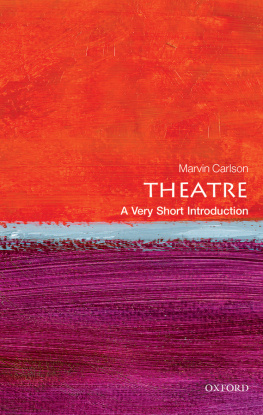
Israeli Theatre
This book conceptualizes Mizrahi (Middle Eastern Jewish) theatre, unfolding its performances in the field of Israeli theatre with a critical gaze. It covers the conceptualization and typology, not along a chronological axis, but rather through seven theatrical forms. The author suggests a definition of Mizrahi theatre that has fluid boundaries and it can encompass various possibilities for self-representation onstage.
Although Mizrahi theatre began to develop in the 1970s, the years since the turn of the millennium have seen an intense flowering of theatrical works by second- and third-generation artists dealing with issues of identity and narrative in a diverse array of forms. Mizrahi theatre is a cultural locus of self-representation, generally created by Mizrahi artists who deal with content, social experiences, cultural, religious, and traditional foundations, and artistic languages derived from the history and social reality of Mizrahi Jews in both Israel and their Middle Eastern countries of origin.
Critically surveying Mizrahi theatre in Israel, the book is a key resource for students and academics interested in theatre and performance studies, and Jewish and Israeli studies.
Naphtaly Shem-Tov is Senior Lecturer and Head of Literature, Language, and the Arts Department at the Open University of Israel. His main research interest is social aspects of Israeli theatre and performance. His books include Acco Festival: Between Celebration and Confrontation (2016) and Improvisational Teaching (2015).
Routledge Jewish Studies Series
Series editor: Oliver Leaman, University of Kentucky
Jewish Studies, which are interpreted to cover the disciplines of history, sociology, anthropology, culture, politics, philosophy, theology, religion, as they relate to Jewish affairs. The remit includes texts that have as their primary focus issues, ideas, personalities, and events of relevance to Jews, Jewish life, and the concepts that have characterized Jewish culture both in the past and today. The series is interested in receiving appropriate scripts or proposals.
THE DIVINE IN MODERN HEBREW LITERATURE
Neta Stahl
THE HOLOCAUST IN THESSALONIKI
Reactions to the Anti-Jewish Persecution, 19421943
Leon Saltiel
BIRTH-THROES OF THE ISRAELI HOMELAND
The Concept of Moledet
David Ohana
THE PHILOSOPHY OF JOSEPH B. SOLOVEITCHIK
Heshey Zelcer and Mark Zelcer
ISRAELI THEATRE
Mizrahi Jews and Self-Representation
Naphtaly Shem-Tov
THE ENVIRONMENT AND LITERATURE OF MORAL DILEMMAS
From Adam to Michael K
David Aberbach
For more information about this series, please visit: https://www.routledge.com/middleeaststudies/series/JEWISH
Israeli Theatre
Mizrahi Jews and Self-Representation
Naphtaly Shem-Tov
First published 2021
by Routledge
2 Park Square, Milton Park, Abingdon, Oxon OX14 4RN
and by Routledge
605 Third Avenue, New York, NY 10158
Routledge is an imprint of the Taylor & Francis Group, an informa business
2021 Naphtaly Shem-Tov
The right of Naphtaly Shem-Tov to be identified as authors of this work has been asserted by him in accordance with sections 77 and 78 of the Copyright, Designs and Patents Act 1988.
All rights reserved. No part of this book may be reprinted or reproduced or utilised in any form or by any electronic, mechanical, or other means, now known or hereafter invented, including photocopying and recording, or in any information storage or retrieval system, without permission in writing from the publishers.
Trademark notice: Product or corporate names may be trademarks or registered trademarks, and are used only for identification and explanation without intent to infringe.
British Library Cataloguing-in-Publication Data
A catalogue record for this book is available from the British Library
Library of Congress Cataloging-in-Publication Data
Names: Shem-Tov, Naftali, author.
Title: Israeli theatre : Mizrahi Jews and self-representation /
Naphtaly Shem-Tov. Other titles: Israeli theater
Description: London ; New York : Routledge, 2021. |
Series: Routledge Jewish studies series | Includes bibliographical references and index.
Identifiers: LCCN 2021000292 (print) | LCCN 2021000293 (ebook) |
ISBN 9781138542334 (hardback) | ISBN 9781351009089 (ebook) |
ISBN 9781351009072 (adobe pdf) | ISBN 9781351009065 (epub) |
ISBN 9781351009058 (mobi)
Subjects: LCSH: TheaterIsraelHistory. | Mizrahim in the theaterIsrael. |
Theater and societyIsrael. | MizrahimIsraelSocial conditions20th century.
Classification: LCC PN2919.4 .S49 2021 (print) |
LCC PN2919.4 (ebook) | DDC 792.095694dc23
LC record available at https://lccn.loc.gov/2021000292
LC ebook record available at https://lccn.loc.gov/2021000293
ISBN: 978-1-138-54233-4 (hbk)
ISBN: 978-1-032-00721-2 (pbk)
ISBN: 978-1-351-00908-9 (ebk)
Typeset in Times New Roman
by Newgen Publishing UK
This book is dedicated with love to my family:
To Vered, who supports, encourages, and listensmany ideas in this book grew out of our fruitful conversations.
To my daughters Shira and Avigailyou fill my life with light and joy.
Contents
The journey of this study began with a little note. When asked what Mizrahi theatre is, I jotted down, in short points, a few of the dominant forms of theatre associated with Mizrahi artists. Over time, what I had jotted down on that note became the main points for this book. The note was written in preparation for a panel I participated in that dealt with theatre and Mizrahim held at the Libi BaMizrah (My Heart Is in the East) festival in 2012. The festival was founded in 2009 by Mizrahi feminists as part of their struggle for just distribution of Israels culture budget. With the turn of the millennium and the rise of the Mizrahi middle class, Israel witnessed the burgeoning of a cultural renaissance of third-generation Mizrahi artists. Mizrahi theatre, which germinated in the margins of the field in the last quarter of the twentieth century, is today a prominent and significant presence in the public sphere. In this sense, this book is not a summary of a phenomenon, but rather an attempt to understand it as it comes into being, with the hope that other scholars will join the discussion and discourse.
My interest in Mizrahi identity and theatre, however, emerged many years earlier. I was born in 1975 and raised in Kfar Shalema working-class neighborhood in the south of Tel Aviv. I love acting, and theatre was always a part of my life. As a teenager, I participated in social youth theatre at the Neve Eliezer community center led by Zmira Ron and Ada Mirsky, and later, as a discharged soldier, I joined the community theatre under the direction of Peter Harris. For me, this was the most significant framework in which I learned about theatre and how to know myself with a critical eye. As part of my intense adolescent engagement with questions of identitywho am I? and what is my role in the world?Mizrahiness became a foundation for personal development and the understanding that my identity is firmly related to the history of my family and community. My parents immigrated to Israel in 1951. My father, Fuad, was born in Iraq, and my mother, Naomi, was Iranian born of Kurdish descent. Like many other Mizrahim of their generation, my parents were uneducated and soon found themselves routed toward the Israeli working class. Critical insights regarding my parents circumstances, as well as my own, became more and more lucid as a student of community theatre at Tel Aviv University. During that time, I received a scholarship from the Israel Scholarship Education Foundation (ISEF), a foundation for the advancement of students from development towns and low-income neighborhoods. It was at events organized by ISEF that I met several friends who came from backgrounds similar to mine. Gradually, I became involved in the critical Mizrahi discourse that had already germinated in the 1990s and as a result of the Internet and social media revolution, I broadened my acquaintance with Mizrahi activists and intellectuals. This project, then, is not an academic study alone, but rather bears deep personal significance for me.







